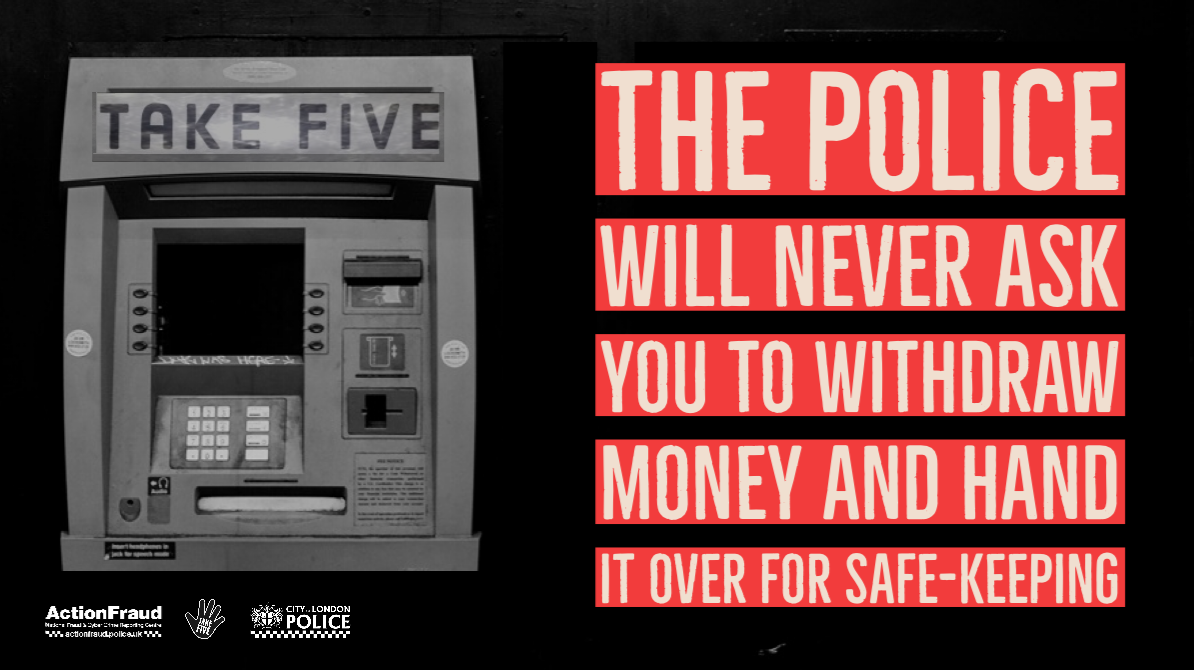Action Fraud, the City of London Police, Cifas and Equifax launch Identity Fraud Campaign with the hashtag #AreYouOneofThem.

- YouGov Survey commissioned by Equifax reveals that people in the UK are aware that they need to improve their online safety but still aren’t doing so.
- Identity fraud is estimated to cost the UK £5.4 billion per year.
- 172,919 people reported identity fraud to Cifas in 2016 with the reporting figures steadily rising since 2008.
Today we have launched an identity fraud campaign with the City of London Police, Cifas and Equifax, asking members of the public to consider how careful they are with their personal and financial details. A recent YouGov Survey commissioned by Equifax found that the UK population are failing to take basic steps like protecting passwords or installing anti-virus software to protect their identities from criminals.
Identity fraud has been growing steadily over the past 10 years according to the 2016 Annual Fraud Indicator and it is estimated that the cost of identity fraud to the UK is £5.4billion. Figures recorded by Cifas show that identity fraud now represents over half of all fraud members, with 9 out of 10 perpetrated online. In 2016, 172,919 people reported identity fraud to Cifas.
The recent survey commissioned by Equifax has helped to reveal some of the public’s attitudes towards protecting their identity.
The survey found:
- 55% of people surveyed access public Wi-Fi that is not password protected.
- 40% of people do not have antivirus software installed on their devices.
- 27% of people use the same password for multiple accounts.
- 32% admit that they are at risk to identity fraud because of their behaviour.
- 31% of people think the over 60s are the most at risk to fraud.
This shows that some UK citizens are still leaving their doors wide open to identity fraudsters. The #AreYouOneofThem campaign is urging people to be more vigilant to help protect themselves from fraudsters.
City of London Police, Commander Dave Clark, National Police Coordinator for Economic Crime said: “The recent survey results have highlighted that we need to do more to protect ourselves from fraudsters. There is a common misconception that only old people fall victim to fraud but reports show that every age and demographic is affected.
“There is no doubt that identity fraud is a growing problem and this is why we have launched our #AreYouOneofThem campaign . We want to draw people’s attention to identity fraud and to highlight the risks they face when sharing details online.
“Throughout the week we are urging people to think about their online behaviour and look at our advice to find out what they can do to protect themselves from identity fraud”.
How to protect yourself from identity fraud:
- Set your privacy settings across all the social media channels you use. And just think twice before you share details – in particular your full date of birth, your address, contacts details – all this information can be useful to fraudsters!
- Password protect your devices. Keep your passwords complex by picking three random words, such as roverducklemon and add or split them with symbols, numbers and capitals:R0v3rDuckLemon!.
- Install anti-virus software on your laptop and any other personal devices and then keep it up to date. MoneySavingExpert have a recommended list of the best free anti-virus software: www.moneysavingexpert.com/shopping/free-anti-virus-software
- Take care on public wi-fi – fraudsters hack them or mimic them. If you’re using one, avoid accessing sensitive apps such as mobile banking.
- Download updates to your software when your device prompts you – they often add enhanced security features.
What to do if you're a victim:
- ACT FAST if you think you have been a victim of identity fraud
- If you receive any mail that seems suspicious or implies you have an account with the sender when you don’t, do not ignore it.
- Get a copy of your credit report as it is one of the first places you can spot if someone is misusing your personal information – before you suffer financial loss. Review every entry on your credit report and if you see an account or even a credit search from a company that you do not recognise, notify the credit reference agency. They all offer a free service to victims of fraud
- Individuals or businesses who have fallen victim to identity fraud should report to us.
- If you have information about those committing identity crime please tell independent charity Crimestoppers anonymously online or call on 0800 555 111.
- If you have been a victim of fraud, you can contact Victim Support for free, confidential advice and support. Victim Support is the independent charity for victims and witnesses of crime in England and Wales.
Lisa Hardstaff, identity fraud expert at Equifax said: “How people manage and store their passwords for their online accounts is the first line of defence to keeping their personal information safe and secure from fraudsters. “The fact that just under a third use the same password for multiple accounts and slightly more admitted to writing them down, clearly demonstrates people are being complacent and are of the belief that their personal information won’t be at risk. “The majority also thought that it is the over 60s that are most at risk of identity fraud, but the reality is that ID fraud is an indiscriminate crime that affects all ages in the UK irrespective of where they live or how much they earn. Everyone is vulnerable – so everyone needs to be vigilant.”
Simon Dukes Chief Executive at Cifas said: “With nine out of ten identity frauds committed online, identity fraud continues to be a significant fraud threat. Our statistics show that all age groups are at risk, with younger people increasingly so, therefore we welcome this new campaign and urge everyone to take more responsibility in protecting their personal information and avoid making themselves an easy target for the identity fraudster.
“However, it isn’t just members of the public that need to be mindful of the threat, the survey also reveals that 52% of people wouldn’t be willing to share their personal details with organisations that have lost customer data. The fight against fraud is a collaborative effort. This finding should serve as a wake-up call to any organisation that handles personal data. The consequences of not taking data security seriously can directly impact an organisation’s bottom-line as well its reputation.”



